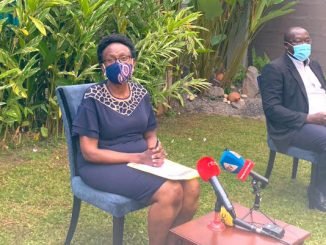
Kampala, Uganda | URN | People with pre-existing medical conditions will have to present medical records before they can get the COVID-19 vaccine in Uganda. According to the Ministry of Health, presenting medical records is a safety measure to ensure that the right people get the vaccine.
Comorbid conditions in COVID-19 patients include cancer, chronic kidney disease, heart disease, asthma Down syndrome, obesity, cystic fibrosis, hypertension (high blood pressure), dementia, pregnancy, and type 2 diabetes.
Persons with these conditions were listed among priority groups that needed to be urgently vaccinated, before the roll-out of COVID-19 vaccinations across the country.
According to the health ministry, 500,000 people are registered as having comorbidities and are eligible to get their first AstraZeneca jab as long as they are 18 years and above. But there are reports that persons that do not fall under the priority groups are being vaccinated already, yet those who urgently need the vaccines are left out.
Uganda has only been able to access 964,000 vaccines to date. Other vaccines are expected in May 2021. Now the Ministry has said that all people in this group will be expected to present either medical records or even medication to prove that they are sick, and need to get the vaccine.
Dr Alfred Driwale, the programme manager of the Uganda National Expanded Programme on Immunization (UNEPI) says that medical records are needed to make sure no dishonest people pretend to be sick to get the jab.
According to the health ministry, the uptake of the vaccine has however been slow among these targeted groups. So far, only 129,634 people are vaccinated out of an estimated 3,400,000 among health workers, security forces and persons above the age of 50.
Read Also: New study finds AstraZeneca COVID-19 vaccine effective amidst global skepticism
30-year-old Petua Nakagala who suffers from hypertension says that she was turned away from the vaccination centre at Victoria Hospital because of her age.
When asked why younger people with comorbidities were being sent away from some vaccination centres, Dr Driwale said that the hospitals probably didn’t know that vaccination had been opened up for this group.
“We recently opened up to this group so some health workers did not know,” he said. Dr Driwale also urged people to wait their turn to get the vaccines.
“We have heard reports that people who should not be getting the vaccine are the ones benefiting. They go and beg health workers to get the vaccine yet this is not their turn. Please, let everyone be patient and wait,” he added.



